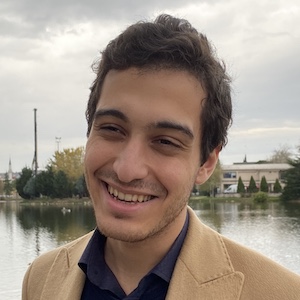Our testimonials: Omer

Our testimonials: Omer
Meet Omer from Türkiye
Student of Cognitive Neuroscience and Clinical Neuropsychology
"One of the best parts of studying here is the chance to work closely with professors on real projects. Students are included in research and can gain hands-on experience while being part of an active academic community"

About myself
I'm Ömer Erdoğan, a graduate student deeply interested in understanding how people think and make decisions about what is "good" and "bad." With a passion for philosophy and a focus on Cognitive Neuroscience, I aim to integrate these fields by studying the mechanisms of moral attitudes, including emotions, psychophysiology, cognition, and their roles in shaping moral choices. I have a strong connection with art and enjoy expressing my thoughts and emotions through related activities. I am passionate about classical music and opera. Living in Padova, I often go to concerts and visit art galleries, which inspire me and give me new ideas. Outside of my academic and artistic interests, I enjoy exploring new places, learning about history, walking through the city, and spending time in museums or quiet cafés. These experiences help me reflect and find new ways to connect with the world.
Why did you choose the University of Padua and the Cognitive Neuroscience and Clinical Neuropsychology? Why would you recommend it to other students?
I chose the University of Padua for its strong reputation, the flexibility of the Cognitive Neuroscience and Clinical Neuropsychology programme, and the excellent scholarship opportunities it offers. The programme allows students to explore many areas in the field and focus on the ones they are most passionate about, which was a key factor in my decision. One of the best parts of studying here is the chance to work closely with professors on real projects. Students are included in research and can gain hands-on experience while being part of an active academic community. This makes the learning process practical, engaging, and rewarding. Padua is also a beautiful, historic city with stunning architecture. Its rich history is combined with a dynamic student life, making it a joyful place to live and study. The city is full of energy and offers a supportive environment for both personal and academic growth.
The availability of scholarships was another important reason for choosing Padua. These opportunities make it more accessible for students from different backgrounds to study here and focus on their goals by minimizing financial stress. I highly recommend the University of Padua for anyone seeking a flexible education, close connections with professors, and the chance to live in a historic, lively city with scholarship support.
What are the main features of your degree programme?
The Cognitive Neuroscience and Clinical Neuropsychology programme at the University of Padua offers a flexible and interdisciplinary education, allowing students to explore various topics in neuroscience and psychology and focus on their specific interests. The programme integrates theory with practice, giving students the opportunity to participate in research projects, gain hands-on experience, and work closely with professors. It builds a strong foundation in advanced research methods, preparing students for careers in research, clinical practice, or industry. The international environment encourages cultural exchange, and the vibrant, historic city of Padua creates an inspiring setting for academic and personal growth. This programme’s flexibility and opportunities for professional development make it an excellent foundation for pursuing a PhD.
Is there any class/subject that has stood out to you?
I really enjoyed the Affective Neuroscience and Psychopathology course because it closely aligned with my research interests. As someone who often relies on reason, this course helped me realize the significance of emotional processes. It encouraged me to explore and understand my emotional side more deeply, making it impactful not just academically but also personally. Another course I thoroughly enjoyed was Neuroanatomy. After each topic, we had the opportunity to apply what we learned in the lab, working with real brain specimens. This hands-on experience made the course both fascinating and highly educational.
What advice would you give when it comes to preparing a successful application?
My background is strongly rooted in social psychology and philosophy, which has shaped my approach to understanding human behaviour and thought. When I applied to the programme, I explained my interest in studying the social aspects of neuroscience to deepen my understanding of these connections. For anyone considering this programme, I suggest having a clear structure and rationale for why you’re choosing it and how it aligns with your goals. Understanding your motivation and how this programme fits into your aspirations is key to making the most of the experience.
What advice would you give to potential students thinking of studying in Italy?
Start by researching your programme carefully and thinking about why you want to study it. Italian universities, like the University of Padua, offer great opportunities, but it’s important to know your goals and how the programme fits them. Finding housing in Padua can be challenging, so try to secure a place as soon as possible. Start looking early, and don’t hesitate to ask for advice from the university or fellow students. Language might be a bit of a challenge. While you won’t have issues at the university, learning some basic Italian will make daily life much easier. Italy has a relaxed lifestyle, which can be refreshing but might require patience, especially for things like paperwork. Talk to people who’ve had similar experiences, check regulations, and stay calm—it will all work out. Be sure to check available scholarships and keep track of deadlines. Missing important dates can make things more difficult, so stay organized and plan ahead. Moving to a new country can feel overwhelming at first. Take time to enjoy small things like trips to nearby cities. This is especially helpful when classes get busy, and you start to feel homesick. Don’t isolate yourself—make an effort to go out, explore, and connect with others. Most people will have similar concerns as you will have, don’t hesitate to share.
What do you do when you’re not studying?
In my free time, I enjoy spending time with friends at the bars near the university. I also love traveling to different cities to explore their food, art, history, and culture. In Padova, I regularly attend classical music concerts, which are affordable for students. Sometimes, I prefer being alone. I like walking around the city, visiting parks, reading, reflecting, and writing. These moments help me recharge and stay focused
MEET OUR TESTIMONIALS
Many students shared their experiences at the University of Padua.
Find out their stories!


